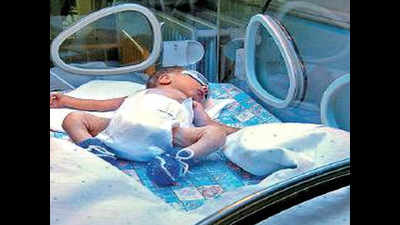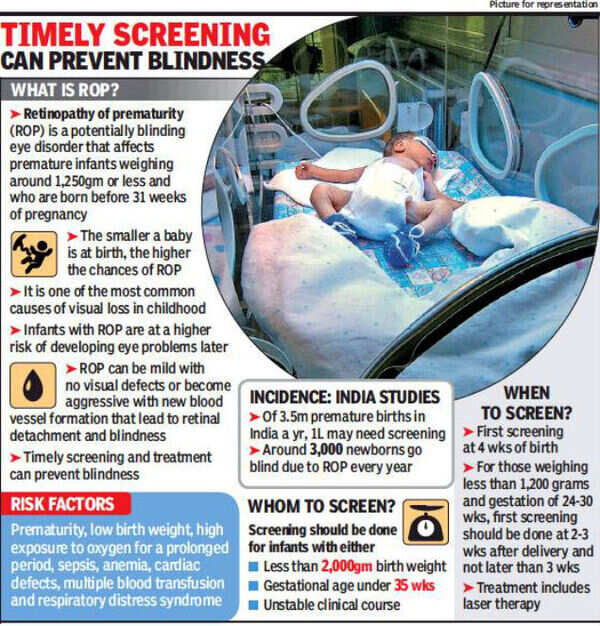- News
- City News
- mumbai News
- ‘Parents not told of screening of eyes in pre-term babies’
Trending
This story is from June 16, 2019
‘Parents not told of screening of eyes in pre-term babies’
Given India’s poor record of health data, doctors fear more than 3,000 preterm babies face the risk of blindness due to untreated retinopathy of prematurity (ROP).

A study undertaken closer home by Dr Sucheta Kulkarni of H V Desai Eye Hospital in Pune showed that almost three-fourth of the children who had turned blind due to ROP hadn’t been been screened for the condition
MUMBAI: Given India’s poor record of health data, doctors fear more than 3,000 preterm babies face the risk of blindness due to untreated retinopathy of prematurity (ROP).
Dr Santosh G Honavar, editor of the Indian Journal of Ophthalmology, has noted in a recent article that around 20,000 newborns need ROP management.

A study undertaken closer home by Dr Sucheta Kulkarni of H V Desai Eye Hospital in Pune showed that almost three-fourth of the children who had turned blind due to ROP hadn’t been been screened for the condition.
Screening entails looking at the retina using a special lens; extra blood vessels growing throughout the premature baby’s retina can be easily spotted within a few weeks of birth and treated. Pune district has a network of technicians who have the special screening device attached to a digital camera that they use to look at a premature baby’s eyes and send the image to a doctor sitting in H V Desai Hospital.
“ROP is detected in metro cities such as Mumbai and Pune but there is no system beyond even a few kilometres outside city limits,” she said. Incidentally, most of the affected children in Dr Kulkarni’s study were born in smaller cities that now boast NICUs.
Pediatrician Dr Bhupendra Awasthi of Surya Hospital, Santa Cruz, said ROP is now routinely detected and treated in cities such as Mumbai. “There has been a lot of improvement in the last five years,” he said. “The rule is that every child born before 32 weeks of pregnancy should be screened for ROP,” he added.
Dr Jalali said ROP-related blindness seems worse because it is preventable.
“As these blind babies grow up, all healthcare personnel will have to answer them as to why they went blind when knowledge and technology were known at least 30 years ago in countries from where we imported the incubator and newborn survival technology,” said Dr Jalali, adding that “safety nets should have been transferred along with technology”.
The Indian Retinopathy of Prematurity (iROP) Society of India is holding a meeting in PGIMER, Chandigarh, next week to discuss ways to generate awareness among doctors and parents about this disease.
Dr Santosh G Honavar, editor of the Indian Journal of Ophthalmology, has noted in a recent article that around 20,000 newborns need ROP management.

A study undertaken closer home by Dr Sucheta Kulkarni of H V Desai Eye Hospital in Pune showed that almost three-fourth of the children who had turned blind due to ROP hadn’t been been screened for the condition.
“We looked at the history of 66 children who come to our hospital with ROP blindness, and the majority of the parents said that they had never been told about the screening,” said Dr Kulkarni.
Screening entails looking at the retina using a special lens; extra blood vessels growing throughout the premature baby’s retina can be easily spotted within a few weeks of birth and treated. Pune district has a network of technicians who have the special screening device attached to a digital camera that they use to look at a premature baby’s eyes and send the image to a doctor sitting in H V Desai Hospital.
“ROP is detected in metro cities such as Mumbai and Pune but there is no system beyond even a few kilometres outside city limits,” she said. Incidentally, most of the affected children in Dr Kulkarni’s study were born in smaller cities that now boast NICUs.
Pediatrician Dr Bhupendra Awasthi of Surya Hospital, Santa Cruz, said ROP is now routinely detected and treated in cities such as Mumbai. “There has been a lot of improvement in the last five years,” he said. “The rule is that every child born before 32 weeks of pregnancy should be screened for ROP,” he added.
Dr Jalali said ROP-related blindness seems worse because it is preventable.
“As these blind babies grow up, all healthcare personnel will have to answer them as to why they went blind when knowledge and technology were known at least 30 years ago in countries from where we imported the incubator and newborn survival technology,” said Dr Jalali, adding that “safety nets should have been transferred along with technology”.
The Indian Retinopathy of Prematurity (iROP) Society of India is holding a meeting in PGIMER, Chandigarh, next week to discuss ways to generate awareness among doctors and parents about this disease.
End of Article
FOLLOW US ON SOCIAL MEDIA










